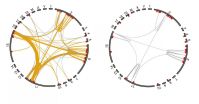COPD is a serious chronic respiratory disease that is often characterized by flare-ups, called acute exacerbations, in which the patient may experience increased coughing, mucus, shortness of breath, wheezing, and a feeling of tightness in their chest. If exacerbation symptoms are not detected and treated in a timely fashion, they can escalate, leading to repeated trips to the emergency department, hospitalizations, disability, and a diminished quality of life.
The Pennsylvania Study of COPD Exacerbations (PA-SCOPE), led by Gerard J. Criner, MD, FACP, FACCP, Founding Chair of the new Department of Thoracic Medicine and Surgery at Temple University School of Medicine, and Director of the Temple Lung Center, revealed that COPD patients who used a digital health application to report their daily symptoms and received same-day treatment recommendations from their health care provider experienced fewer and less severe COPD exacerbation symptoms, which led to an improvement in daily symptom control, lung function, and activity status.
The digital health application allows COPD patients to report their respiratory symptoms and peak expiratory flow measurements, which were assessed by a computer algorithm and compared with initial values to achieve a symptom deviation score - a measure of how serious the symptoms are relative to the patients' baseline metrics. Scores in excess of a predetermined threshold were reviewed by a nurse and referred to a physician who prescribed treatment. The application allowed health care providers to initiate treatments that were optimized for individual patients' symptoms on the same day that COPD symptoms worsened.
"Previous studies at other sites have questioned the efficacy of various telemedicine solutions in COPD patients, but those studies have not used a solution that enables same-day treatment in response to worsening patient symptoms," says Dr. Criner, who served as the principal investigator of the study. "We have been studying digital health solutions for COPD symptom management for over a decade and are pleased that the improvements we have seen in our patients in response to early identification and intervention has been documented in this clinical study."
The study also revealed an encouraging degree of reporting compliance by moderate to severe COPD patients who used the digital health application, as evidenced by the high rate of daily symptom reporting sustained over a prolonged period.
While the study failed to enroll the number of patients needed to show either a mortality benefit or reduction in hospitalization days prior to the end of study funding, results were in the predicted direction. "Future studies are needed with greater numbers of patients enrolled to be able to address that outcome, and additional research is already underway with that aim," says Francis Cordova, MD, Medical Director of the Lung Transplantation Program at Temple University Hospital, and lead author on the study.
The technology employed in the study is a precursor to the solution currently offered by Temple University spin-off company HGE Health Care Solutions. "The clinical research being conducted at Temple continues to reveal the ability of telemedicine and digital solutions to provide meaningful, measurable results for COPD symptom management," said Michael J. Markus, PhD, CEO of HGE. HGE's application is also supported by Temple's recently launched Center for Digital Health.
INFORMATION:
PA-SCOPE was supported by the Pennsylvania Department of Health (grant RFA 02-07-20), and the publication will appear in the February 2016 issue of Telemedicine and e-Health. The publication was made available online ahead of print on August 10, 2015.
Editor's Note: HGE Health Care Solutions is a Temple University spin-off company and the exclusive licensee to certain Temple University intellectual property.
Dr. Gerard Criner is the founder of HGE Health Care Solutions.
Both Temple University and Dr. Criner are minority owners in the company.
About Temple Health
Temple University Health System (TUHS) is a $1.6 billion academic health system dedicated to providing access to quality patient care and supporting excellence in medical education and research. The Health System consists of Temple University Hospital (TUH), ranked among the "Best Hospitals" in the region by U.S. News & World Report; TUH-Episcopal Campus; TUH-Northeastern Campus; Fox Chase Cancer Center, an NCI-designated comprehensive cancer center; Jeanes Hospital, a community-based hospital offering medical, surgical and emergency services; Temple Transport Team, a ground and air-ambulance company; and Temple Physicians, Inc., a network of community-based specialty and primary-care physician practices. TUHS is affiliated with Temple University School of Medicine.
Temple University School of Medicine (TUSM), established in 1901, is one of the nation's leading medical schools. Each year, the School of Medicine educates approximately 840 medical students and 140 graduate students. Based on its level of funding from the National Institutes of Health, Temple University School of Medicine is the second-highest ranked medical school in Philadelphia and the third-highest in the Commonwealth of Pennsylvania. According to U.S. News & World Report, TUSM is among the top 10 most applied-to medical schools in the nation.
Temple Health refers to the health, education and research activities carried out by the affiliates of Temple University Health System (TUHS) and by Temple University School of Medicine. TUHS neither provides nor controls the provision of health care. All health care is provided by its member organizations or independent health care providers affiliated with TUHS member organizations. Each TUHS member organization is owned and operated pursuant to its governing documents.
About HGE Health Care Solutions, LLC
HGE Health Care Solutions offers chronic disease management solutions that improve patient care and achieves clinical and financial outcomes for hospital systems and payors, and provides development, validation and clinical research support for industry partners. http://www.hge.healthcare



